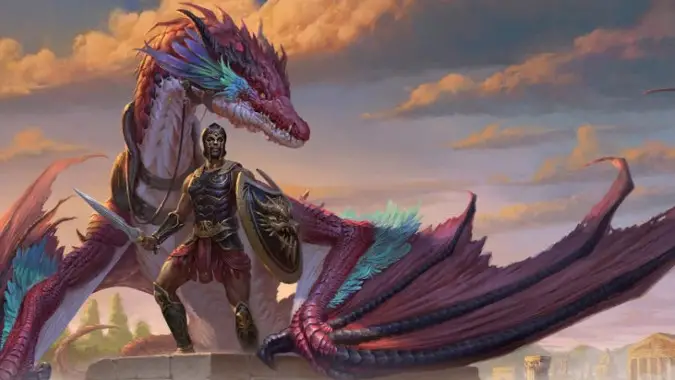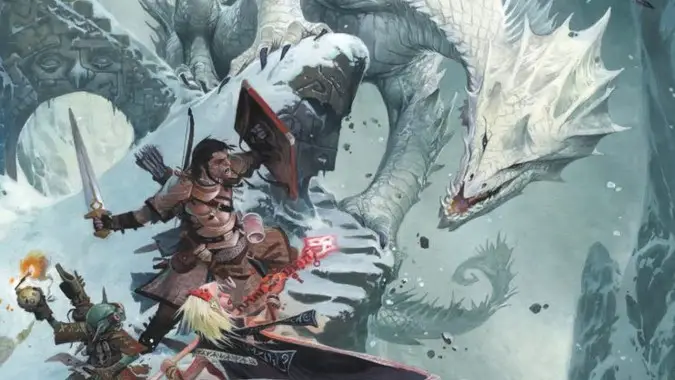How to play D&D online

Hey, Matt?
Yes, rhetorical device I’m using to open an article?
You host a Blizzard Watch D&D game, right?
Yes I do, imaginary friend.
But don’t you all live in different places? How can you play Dungeons and Dragons with people who all live so far away, do you fly them up to your house or something?
I’m glad you asked me that, person I invented for the purposes of this post — because no, I don’t do that at all. It would be prohibitively expensive and then I’d have Mitch sleeping on my couch and my cats would probably climb all over him while he slept, purring and yowling their consternation at a strange person they didn’t know in their favorite spot. Then the clawing and biting would begin. No, we play Dungeons and Dragons entirely online. Today we’re going to talk about how exactly we get this done, just in case your game can’t take place in person, either.

The Virtual Tabletop
Let’s be clear — while D&D and other Tabletop RPGs were designed and intended to be played by a group of people around a table, the fact remains, for many of us there just aren’t groups in our area we can game with. Maybe we’ve aged out of being comfortable just heading down to the local shop and looking for a game, or maybe our lives have gotten to the point where it’s hard to commit to a group due to travel or work considerations, or maybe we live in the middle of Sasquatch and Wendigo country and we can’t easily find a group among the woods apes.
But there are alternatives. You can play RPGs online, with the help of various Virtual Tabletop sites and programs that help you, and if you’re a fan of a more stripped down experience, you can go as simple as using Discord with a dice roller bot in a dice roll channel to keep it simple for everyone. That’s how the Blizzard Watch D&D game is run, because I am exactly the kind of person who wants to fiddle with as little as possible while I run a game. But that’s not how every GM wants to work, so let’s discuss some options
A Virtual Tabletop program is something that lets you do what you would do with your actual tabletop — lay down a map, move representations of your characters around, and roll dice. These can range from fairly basic to very sophisticated. Some, like RPGTools or Foundry Virtual Tabletop are programs that you download and run on your computer. I personally find it easier to use a Virtual Tabletop site. Some of the ones I’ve used are Fantasy Grounds, Astral Tabletop (which I believe has both a home and site version) and the big dog of online Virtual Tabletops, Roll20. Each of these sites can be used to host a variety of games — both Roll 20 and Fantasy Grounds, for example, host not just D&D but other games like Pathfinder.
I admit that I’m the most familiar with Roll20, but I have to say that the broad array of games Fantasy Grounds offers is really neat if you like to run various kinds of games, not just stick to D&D. These tools provide a broad variety of options — character sheets, dice rollers, loadable and/or created maps with virtual tokens to help represent combat and even music and chat. Roll20 can even do full voice chat. It comes down to figuring out which product is best suited to your needs, which is something you’ll have to work out for yourselves.

Theatre of the Mind online
But remember, if you’re not interested in going too tool-heavy, a simple Discord server with a dice bot can work just fine for you. The DM of my Sunday game, John Wigger, introduced me to Sidekick and I like it a lot, even though it has the same problems any dice bot can have like becoming nonresponsive or seemingly rolling low malevolently, but that happens with anything, even actual dice. And if you like Sidekick, the Patreon is there for you to help support it.
I find that this approach works best with what is often called Theatre of the Mind, where you essentially take the complicated combat rules of various RPGs and just describe everything, and everyone uses their imaginations instead of miniatures or virtual versions of them. It can be a lot of work for a DM, but it does mean you don’t need as many tools.
Going the Discord route does mean you lack things like Character Sheet support, but that’s what D&D Beyond is for, in my opinion, and it’s a great resource. It has the ability to help you create Encounters, roll up characters and monsters, and even make your own homebrew content like magical items. If you’re planning on playing a game of D&D online, it’s very helpful.
That’s probably enough to get started on your adventures with your virtual party. Remember to have fun and keep in mind that just because you’re not playing at an actual table, it doesn’t mean you’re not playing tabletop.
Please consider supporting our Patreon!
Join the Discussion
Blizzard Watch is a safe space for all readers. By leaving comments on this site you agree to follow our commenting and community guidelines.
 @MatthewWRossi
@MatthewWRossi



